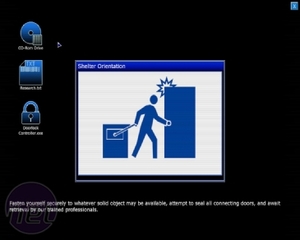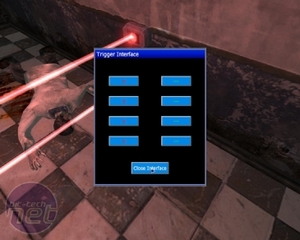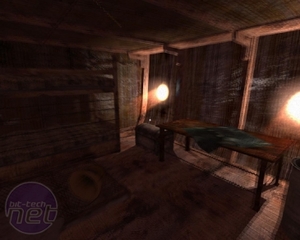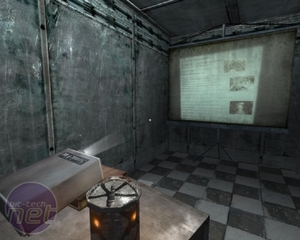Penumbra: Black Plague
February 20, 2008 | 08:02
Companies: #frictional-games #indie #novint #paradox

Genre Bender
Of course, all games have flaws and Black Plague is no exception. There are a few noticeable quirks and chinks in the armour of the game – some more jarring than others.My major problem with the game was the voice acting. Mostly the game uses an intriguing blend of voice and text to let Philip communicate with the players and yet still keep an open character. When Philip thinks or speaks it appears as text, but when somebody speaks to Philip it is handled as voice instead – and yes, the Shelter Project isn’t as abandoned as you’d think. There are three or four people who speak to Philip as he makes his way out, each wanting help in their own special way.
Unfortunately, not all of these voices are up to the task and the voice of one character especially, Dr. Amabell Swanson, stands out as being particularly badly done. Amabell is a character who is often heard throughout the game and communicates with Philip through the numerous unmanned computers in the game.
Now, while the sound in pretty much all of the rest of the game is beautifully put together and suitably scary, Amabell’s voice utterly destroys the suspension of disbelief. The whole illusion and enthrallment comes crashing down as she, one of only a handful of survivors in this monster-filled laboratory, calmly chides herself for insulting you.
Another major problem that crops up in the end-game phase of Black Plague is that the puzzles start to grow harder in ways which are just as logical, but much more unfair. For example, one of the last puzzles in the game has players hunting down different chemicals and components from various labs. For the most part it’s handled pretty well and the required pieces are found in usual places. Go through a few drawers and check every desk and you won’t have a worry.
It’s less forgivable when some of the final pieces are hidden behind books on a shelf or under a pile of bottles. It flies in the face of the games entire theme. As a terrified, weaponless civilian I wasn’t in the habit of knocking down everything in the room in the hope finding solutions to a puzzle and nothing will ever convince me that a logical place to keep bromine is behind some textbooks.
In fact, to be brutally honest, the penultimate ten minutes of the game feel quite poorly put together and though it would spoil the story to explain it, suffice it to say that the last few hurdles make it feel more like jumping through hoops – which is a shame given the excellent build-up.
Still, this period of let-down is only brief and the game recovers well by pulling the player down into Philip’s mind and giving a massively satisfying ending – the type which ties everything up neatly, but leaves enough mystery and ambiguity for a sequel at some point.
The latter stages of the game also stand out as having excellent level design too and the complex in which Philip finds himself does a good job of feeling foreboding and labyrinth, despite actually being smaller and linear than you might think. It’s impossible to get lost for long and the way levels link together with occasional confrontations, hallucinations and lapses of surrealism is one of the stand-out features of the game.
Conclusions
Black Plague is a radically different game to Overture in terms of pacing and style, but at the same time in manages to incorporate many of the same themes and plot elements.In truth, Black Plague feels more like a professionally produced game, for both better and worse. While Overture was a decidedly indie effort that seemed to thrive on its rough edges and unusual delivery, Black Plague is a game that has a more shiny, refined and polished feel to it all the way through.
It’s clear that Frictional has taken on board some of the major complaints about the games
 too – Penumbra: Black Plague introduces collectable items to extend replayability, more solutions to puzzles along with characters and narrative that are more fully fleshed out and realised.
too – Penumbra: Black Plague introduces collectable items to extend replayability, more solutions to puzzles along with characters and narrative that are more fully fleshed out and realised.On the down side, like many professional games, the ending feels a bit rushed and those parts that still reek of indie stand out now as being all the rougher against the polish of the majority.
Still, we reckon there’s a good five or six hours of chilling, puzzling gaming in here and the price isn’t likely to break the bank. With an intriguing mix of ideas and a stunning presentation and design that doesn’t at all hint at the diminutive two-man team behind the series, Penumbra: Black Plague is easily the most impressive break-out game of recent years and belongs in the catalogue of every hardcore gamer who prides himself on his cult-games collection. It's not for everyone - hence my hours of wrestling over whether it's an eight or a nine – but it is superbly put together despite the flaws and deserves mentions as another laudable effort from the diminutive team at Frictional Games.

MSI MPG Velox 100R Chassis Review
October 14 2021 | 15:04













Want to comment? Please log in.